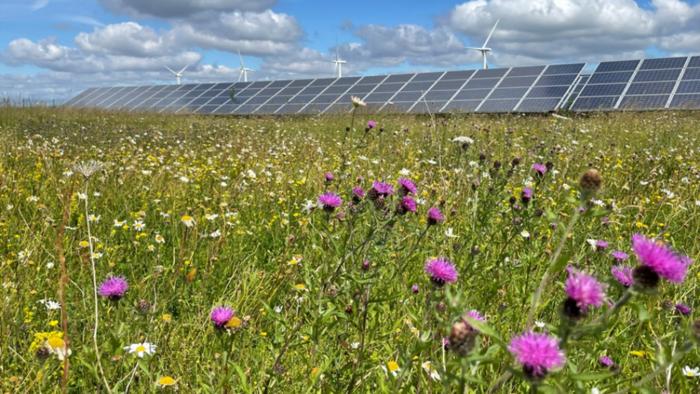Solar farms in the UK could bring benefits for nature as well as provide low carbon energy – but unless policies change, potential benefits for nature could be squandered, scientists argue.

Credit: Hollie Blaydes
Solar farms in the UK could bring benefits for nature as well as provide low carbon energy – but unless policies change, potential benefits for nature could be squandered, scientists argue.
As well as providing low carbon energy, solar farms could offer vital space for nature to thrive if the solar industry is incentivised to locate, construct and manage sites appropriately, a team of researchers and industry experts say in a new paper published in the British Ecological Society’s Journal of Applied Ecology.
The UK’s solar farms currently generate approximately 8.6 GW – enough to meet around one sixth of the country’s peak electricity demand. To meet its international climate commitments, some estimates show that the UK will need to install in the order of 70,000 hectares of solar farms by the mid 2030s.
“If located in the right places and managed correctly, solar farms have great potential to restore degraded habitats and help meet the UN’s Sustainable Development Goals to halt and reverse biodiversity loss, although not every species may benefit,” said Professor Alona Armstrong of Lancaster University and co-author of the paper. “Some in the solar industry embed nature benefits into the design of solar farms and their management, but this approach is not universal.”
Professor Piran White of the University of York and co-author of the paper added: “There is considerable potential for more solar farms to be managed for the benefit of nature, so that existing solar farms and any new solar farms, such as those recently approved by the new Government, can contribute to mitigating the ecological crisis as well as the climate crisis.”
Previous research by some of the scientists behind the paper has shown that pollinating insects can benefit from solar farms managed for biodiversity, and that these benefits can also spill out into surrounding areas if the crops are pollinator-dependent.
However, under current policies, the UK risks missing out on biodiversity benefits that could be delivered by solar farms because existing public financial incentives aimed at increasing biodiversity on agricultural land currently exclude solar farms. In addition, there is much potential to incentivise private funding to boost biodiversity on solar farms.
“Renewable energy, together with strategic land use and management, is essential to address the climate and nature crises,” said Hing Kin Lee, of NextEnergy Capital and co-author of the paper. “The right cross-sectoral policies and incentives can enhance nature on solar farms, providing long-term stable returns and measurable environmental benefits.”
The paper’s authors call on Government to identify opportunities to change policies that currently address climate and biodiversity separately.
Dr Fabio Carvalho, a Senior Research Associate at Lancaster University and lead author of the paper, said: “In order to deliver dual benefits for climate and nature, solar farms not only need to be well managed, but also supported by appropriate public policies that take a more coherent joined-up approach.
“Unless policies aimed at boosting biodiversity on agricultural land include solar farms, we risk missing opportunities to enhance nature through land use change for solar farms, and perhaps even exacerbate the biodiversity crisis if solar farms are not properly built and managed.”
The authors set out several recommendations in their paper including:
- Ensuring solar farms can access public financial incentives that encourage sustainable land use
- Implementing land use policies that incentivise private funding
- Embedding solar farms in biodiversity-inclusive planning policies and decision making
- Creating indicators and metrics that guide the development and assessment of public policies
- Building equity and clarity into the responsibilities and benefits for all actors involved
The recommendations are outlined in full in the paper ‘Integrated policymaking is needed to deliver climate and ecological benefits from solar farms’
Authors of the paper are: Fabio Carvalho, Hollie Blaydes, Lucy Treasure, Stuart P. Sharp and Alona Armstrong of Lancaster University; Hing Kin Lee and Kristina Vucic of NextEnergy Capital; Laura Harrison and Piran White of the University of York; Hannah Montag and Tom Clarkson of Clarkson & Woods Ecological Consultants; and Jonathan Scurlock of the National Farmers’ Union.
The research was supported by the UK Energy Research Centre (UKERC) funded by the UK Research and Innovation Energy Programme and the Knowledge Transfer Partnership (KTP) funded by UKRI through Innovate UK with the support of co-funders.
Journal
Journal of Applied Ecology
DOI
10.1111/1365-2664.14745
Method of Research
Observational study
Subject of Research
Not applicable
Article Title
Integrated policymaking is needed to deliver climate and ecological benefits from solar farms
Article Publication Date
29-Jul-2024




